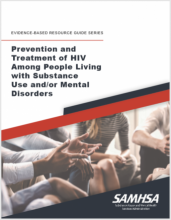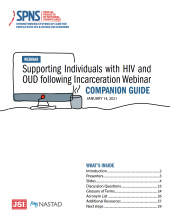
Harm Reduction Hacks is a comprehensive microsite and resource to guide organizations developing new and/or existing syringe services programs in program design, implementation, and organizational sustainability.



Harm Reduction Hacks is a comprehensive microsite and resource to guide organizations developing new and/or existing syringe services programs in program design, implementation, and organizational sustainability.
This publication describes the recent trends of drug overdose deaths in the United States (U.S.) and the benefits of adopting harm reduction approaches.
This CDC report provides updated data related to HIV prevalence among people who inject drugs, documenting findings that underscore the need for low-barrier access to comprehensive and integrated needs-based syringe service programs for necessary prevention and
This discussion guide is intended to elicit a comprehensive and concrete conversation about language, stigma, and discrimination as a means of strengthening care systems and ensuring that people who seek care for HIV and/or substance use disorders, including opioid use disorder, are treated with
This tool focuses on the role of stigma at the intersection of HIV and OUD systems, and introduces opportunities for intervention at the systems level.
Transgender people and communities, including nonbinary people, have specific needs within harm reduction programs.
In recent years, the gap in the rate of opioid overdoses among Black and white Americans has narrowed significantly, with increases in Black mortality driven in part by the addition of synthetic opioids to other drugs.
This technical package, a collaborative effort between CDC and NASTAD, provides a broad framework as well as evidence-informed strategies and approaches to support the planning, design, implementation, and sustainability of new and existing syringe services programs (SSPs).
This virtual session summary describes key takeaways from the August 2020 Let's Talk about SSPs as Essential Services conversation.
This toolkit from the city of Boston, MA aims to facilitate the expansion of harm reduction services, and “help build a culture of harm reduction” in the city.